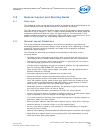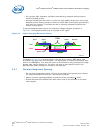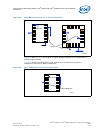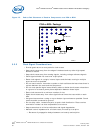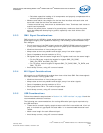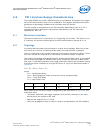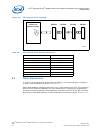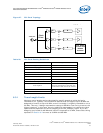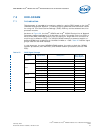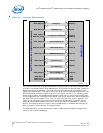
Intel
®
IXP45X and Intel
®
IXP46X Product Line of Network Processors
February 2007 HDD
Document Number: 305261, Revision: 004 71
PCI Interface Design Considerations—Intel
®
IXP45X and Intel
®
IXP46X Product Line of
Network Processors
6.0 PCI Interface Design Considerations
The Intel
®
IXP45X and Intel
®
IXP46X Product Line of Network Processors has a single,
32-bit PCI device module that runs at 33/66 MHz. This chapter describes some basic
guidelines to help design hardware that interfaces with PCI devices.
The PCI module is compatible with the PCI Local Bus Specification, Rev. 2.2. For a
complete functional description and physical requirements, see PCI Local Bus
Specification, Rev. 2.2.
6.1 Electrical Interface
The electrical definition is restricted to 3.3 V signaling environment. The device is not
5 V tolerant. All devices interfacing with the PCI module need to operate at 3.3 V.
6.2 Topology
Interfacing devices need to be connected in a daisy-chain topology. When more than
one device is in the bus, connecting stubs need to be kept as short as possible.
There is a limitation to the number of devices connected to the internal arbiter. If more
than four devices are required to be connected, an external arbiter is required.
The system time budget must be satisfied for 66 MHz and 33 MHz cycles. It is expected
that if the timing budget for 66 MHz clock cycles is satisfied, then the 33 MHz cycles
also work. The following equation and timing parameters need to be met when routing
a board that either interfaces to a single PCI device or up to four devices as shown in
Figure 26.
T
CYC
≥ T
VAL
+T
PROP
+ T
SKEW
+ T
SU
where:
T
VAL
= Valid Output Delay
T
PROP
= Bus Propagation Delay (maximum time for complete flight)
T
SKEW
= Total Clock Skew
T
SU
= Input Setup Time
When defining the maximum length of segments A and B as shown in Figure 26, the
calculation must:
• Include an additional trace length segment from the PCI connector to the input
device within the expansion PCI card.
• Assume the segment to be 1.5 inch.
• Use trace propagation delay of 150 to 190 ps/in as specified by the PCI standard.
@33 MHz T
CYC
= 30 nSec T
VAL
= 11 nSec T
PROP
= 10 nSec T
SKEW
= 2 nSec T
SU
= 7 nSec
@66 MHz T
CYC
= 15 nSec T
VAL
= 6 nSec T
PROP
= 5 nSec T
SKEW
= 1 nSec T
SU
= 3 nSec



